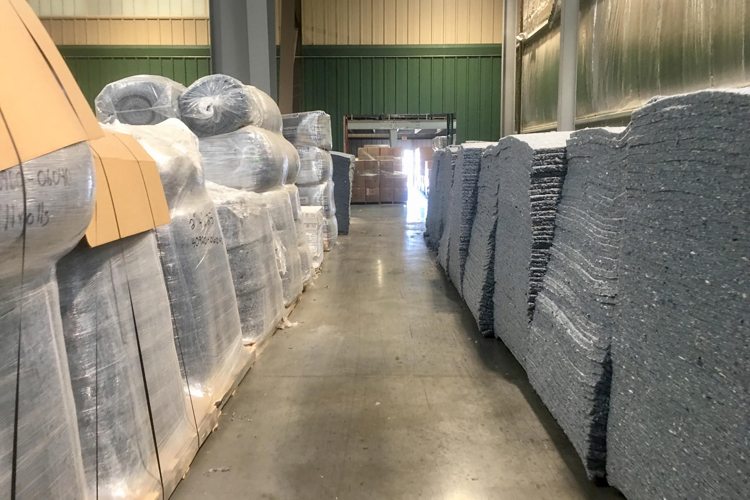Bonded Logic Inc. is in the business of turning blue things green.
The south Chandler textile recycling company collects thousands of pounds of denim jeans, shorts and jackets each year and gives them new life as insulation for homes and office buildings and fiber for bedding.
Clients of Bonded Logic, which has about 175 collection bins in metro Phoenix, include Atlanta’s Hartsfield-Jackson International Airport and the food delivery service Freshly.
Tod Kean, co-founder of Bonded Logic, said the company is out to make money, certainly, but it also serves a wider purpose.
“It’s important to recycle textiles, obviously, because there is only a limited amount of landfill space, and the carbon footprint is very large, especially in large metropolitan areas,” he said. “So, any little bit we do, including textiles, is going to make a difference.”
And it seems that every little bit does help. According to the Environmental Protection Agency, only about 15 percent of unwanted clothing and textiles are recycled each year, which means 21 billion pounds end up in landfills instead.
Lack of demand for recycled textiles is one reason the industry has been slow to grow, said professor Edward Kavazanjian at the Julie Ann Wrigley Global Institute of Sustainability at Arizona State University.
“There’s no incentive for communities to set up textile recycling programs,” he said. “I mean, if your local community didn’t have a bottle recycling program, or didn’t have a newspaper recycling program, I think most consumers wouldn’t bother to recycle.”
Despite of the limited market, Kean said Bonded Logic’s thriving business serves as proof the industry and its products have a lot of room to grow.
“As we develop new technologies and new products to meet specific customer needs,” he said, “we feel that the growth curve is just the beginning right now for these products.”
Inc. is in the business of turning blue things green.
The south Chandler textile recycling company collects thousands of pounds of denim jeans, shorts and jackets each year and gives them new life as insulation for homes and office buildings and fiber for bedding.
Clients of Bonded Logic, which has about 175 collection bins in metro Phoenix, include Atlanta’s Hartsfield-Jackson International Airport and the food delivery service Freshly.
Tod Kean, co-founder of Bonded Logic, said the company is out to make money, certainly, but it also serves a wider purpose.
“It’s important to recycle textiles, obviously, because there is only a limited amount of landfill space, and the carbon footprint is very large, especially in large metropolitan areas,” he said. “So, any little bit we do, including textiles, is going to make a difference.”
And it seems that every little bit does help. According to the Environmental Protection Agency, only about 15 percent of unwanted clothing and textiles are recycled each year, which means 21 billion pounds end up in landfills instead.
Lack of demand for recycled textiles is one reason the industry has been slow to grow, said professor Edward Kavazanjian at the Julie Ann Wrigley Global Institute of Sustainability at Arizona State University.
“There’s no incentive for communities to set up textile recycling programs,” he said. “I mean, if your local community didn’t have a bottle recycling program, or didn’t have a newspaper recycling program, I think most consumers wouldn’t bother to recycle.”
Despite of the limited market, Kean said Bonded Logic’s thriving business serves as proof the industry and its products have a lot of room to grow.
“As we develop new technologies and new products to meet specific customer needs,” he said, “we feel that the growth curve is just the beginning right now for these products.”




